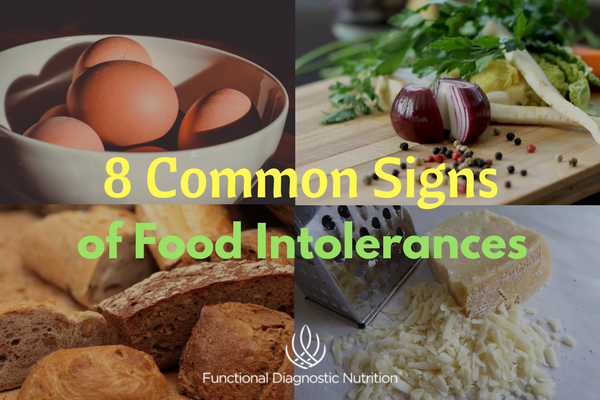.You have been working with a client for a while. You’ve helped them to transition to a healthier way of eating, and they are eating the right balance of macronutrients for their body. And while they are feeling a little better than they did when they begin working with you, they are still dealing with some stubborn health issues that just don’t seem to want to go away.
Your client may be experiencing a hidden food intolerance or sensitivity that hasn’t been discovered yet. And unfortunately, if your client continues to consume the foods they are sensitive to, the symptoms will continue.
What is the difference between a food intolerance and a food allergy?
While the two may have some similar symptoms, a true food allergy can cause a severe, potentially life-threatening reaction called anaphylaxis. Food intolerances are not life threatening, but they sure can make you feel sick.
A food allergy happens when the body sees a certain food as a foreign invader. This prompts the immune system to react to the food. It releases histamine and creates and allergic reaction. Some of the symptoms that can occur with a food allergy include: difficulty breathing, closing off of the throat, vomiting, coughing, hives or rashes, blood pressure drop and swelling. The symptoms of a food allergy can develop almost immediately and become severe, even life threatening quickly.
Food intolerances do not trigger a response from the immune system, but instead But they occur because of the inability to digest or breakdown certain foods properly. Or when a food irritates the stomach. Food intolerances are very common, and more people may be experiencing symptoms without recognizing that they even have a food intolerance. Some symptoms of a food intolerance can appear within 30 to 60 minutes after eating, although others may show up hours and even days after consuming an offending food.
Some of the signs of food intolerances
Regular digestive problems
People with food intolerances typically experience plenty of digestive issues, such as gas, bloating, abdominal pain and frequent diarrhea and/or constipation. So, if your client complains of these issues regularly, then one or more food intolerances may be to blame.
Heartburn
If your client has Gastroesophageal reflux disease (GERD) and experiences regular heartburn, it would be good to test them for food intolerances. Heartburn is a common symptom of hidden food intolerances, and helping them to remove foods that are problematic can help reduce their heartburn.
Mood issues such as depression and anxiety
There is a strong connection between the gut and moods, and food that cause intolerance, create inflammation in the gut. This inflammation has been linked to depression. Many people who change their diet and eliminate the foods they are sensitive to report an improvement in depression and anxiety.
Migraines and headaches
Headaches are not uncommon, and can have a few different causes. But one cause that is often overlooked is food intolerances. Research has found that common foods such as sugar, wheat, dairy, yeast, corn and eggs can trigger headaches and migraines. The chemical additives in processed foods can also be a trigger. So, if you have clients who deal with frequent headaches and migraines, consider the foods they are consuming. Have them tested for sensitivities to uncover which foods are triggering their headaches.
Skin problems
Problems in the gut often manifest as skin issues such as eczema, Rosacea and rashes. Food sensitivities are linked to inflammation in the gut, and inflammation is strongly connected with skin issues as well. But most doctors don’t consider food intolerances when dealing with patients who have skin issues such as eczema, rashes and Rosacea. So if you have a client that comes to you with skin issues, it may be caused by one or more food sensitivities.
Fatigue
Each time a client consumes a food that they react to, it creates additional stress in the body. It places stress on the digestive system and prevents optimal digestion. This can prevent your client from being able to utilize the food they eat for the energy they need to get through the day. As a result, they find themselves struggling to stay awake through the day and feel tired and foggy. This fatigue will be present, even if your clients are sleeping well each night.
Sinus, cold and allergy symptoms that won’t go away
Common symptoms such as nasal congestion, cough, frequent throat clearing, seasonal allergies, ear infections can all be triggered by the foods your clients are eating. If any of your clients have these symptoms and can’t seem to get relief, look at what they are eating!
Can’t lose weight
Do you work with any clients that are eating all the right foods, exercising, and not overeating…but no matter what they do, they just can’t seem to drop the pounds? They might just be eating foods that they are sensitive to! The inflammation in the gut is preventing the weight from dropping off. But when reactive foods are eliminated from the diet, they should be able to reduce their weight much more easily.
If you suspect that a client may have food sensitivities, you can have them do an elimination diet of all the most common reactive foods. But even better is to have them tested for food intolerances. FDN practitioners have access to those types of tests. And they can help clients uncover which food intolerances may be making them sick.
Discovering hidden food intolerances can be life changing for your clients! Removing foods that aren’t working for their body will help to reduce symptoms and get them on the road to feeling better!







